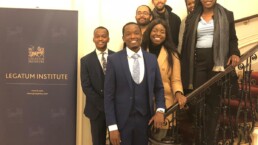Samuel Ewuosho is a Future Africa Forum contributor and expert. Until 2018, Samuel Ewuosho worked at the centre of the UK government to develop and monitor the portfolio of public investment in critical infrastructure. He was personally responsible for energy generation, utilities (including digital) and flood-defence infrastructure, working in collaboration with broad stakeholders to deliver innovations to minimise risk and maximise benefits. Samuel was part of governance boards for ongoing projects, approving funding milestones and challenging tactical assumptions. Given the liberalised energy markets in the UK, much of my work involved deep collaborations with private sector partners and global supply chains.
Whether it was helping to set up the Digital Infrastructure Fund, laying the groundwork for the Smart Metering Programme, helping the Environmental Agency design the Partnership Funding model to attract private financing to flood defences, early investment negotiations with foreign governments and banks for new nuclear technologies, or interpreting the international tax implications for interconnector investors post-Brexit – all of these challenges required dedicated commitment to wider policy objectives, commercial innovation alongside private partners, and delivering climate-resilient infrastructure.
Since leaving the Treasury, he has worked to deliver transaction advisory and commercial due diligence services on an international portfolio of infrastructure investments, including emerging renewable energy technologies. Central to this role is understanding the investment risks associated with the technical design, commercial contracts, scheduling and cash flow modelling, life-cycle operations and financing arrangements of any proposition. He then articulates these risks to investors, challenging assumptions such as cover ratios, liquidated damages and policy interfaces, and developing risk mitigation strategies.
Separately, as a Young Professional Panellist appointed by the Mayor, he works with the Greater London Authority (GLA) to support London’s infrastructure strategy – and this includes the de-carbonisation agenda. For example, one workstream he is personally involved with is supporting regeneration ambitions for local councils, at the heart of which is to deliver decentralised district energy to homes, business and community facilities through local networks. Although still in its very early stages, we are developing the policy tools, financing packages and technical support to roll these measures across the city.
The views expressed in this article are those of the author and do not necessarily reflect the views of Future Africa Forum. Future Africa Forum is a pan-African policy think-tank and policy advisory consultancy headquartered in Nairobi, Kenya.


